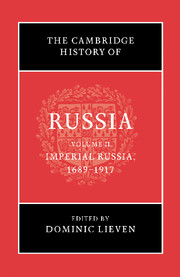Book contents
- Frontmatter
- Introduction
- Part I Empire
- 1 Russia as empire and periphery
- 2 Managing empire: tsarist nationalities policy
- 3 Geographies of imperial identity
- Part II Culture, Ideas, Identities
- Part III Non-Russian Nationalities
- Part IV Russian Society, Law and Economy
- Part V Government
- Part VI Foreign Policy and the Armed Forces
- Part VII Reform, War and Revolution
- Bibliography
- Index
- Map 5. The Russian Empire (1913). From Archie Brown, Michael Kaser, and G. S. Smith (eds.) Cambridge Encyclopedia of Russia 1982.">
- Plate Section">
- References
1 - Russia as empire and periphery
from Part I - Empire
Published online by Cambridge University Press: 28 March 2008
- Frontmatter
- Introduction
- Part I Empire
- 1 Russia as empire and periphery
- 2 Managing empire: tsarist nationalities policy
- 3 Geographies of imperial identity
- Part II Culture, Ideas, Identities
- Part III Non-Russian Nationalities
- Part IV Russian Society, Law and Economy
- Part V Government
- Part VI Foreign Policy and the Armed Forces
- Part VII Reform, War and Revolution
- Bibliography
- Index
- Map 5. The Russian Empire (1913). From Archie Brown, Michael Kaser, and G. S. Smith (eds.) Cambridge Encyclopedia of Russia 1982.">
- Plate Section">
- References
Summary
Empire is one of the most common types of polity in history. It existed from ancient times into the twentieth century. Among its core characteristics were rule over many peoples and huge territories, the latter being a great challenge in the era of pre-modern communications. Military power was crucial to the creation and maintenance of empire but long-term survival also required effective political institutions. Most empires were ruled by some combination of a theoretically autocratic monarch and a warrior-aristocratic class, though in some cases large and sophisticated bureaucracies greatly enhanced an empire’s strength and durability. In the long term the most interesting and important empires were those linked to the spread of some great high culture or universal religion.
Tsarist Russia was a worthy member of this imperial ‘club’. If its long-term historical significance seems somewhat less than that of Rome, of the Han Chinese empire or of the Islamic tradition of empire, its achievements were nevertheless formidable. This is even more the case when one remembers Russia’s relatively unfavourable location, far from the great trade routes and the traditional centres of global wealth and civilisation. The tsarist regime directed one of the most successful examples of territorial expansion in history. Until the emergence of Japan in the twentieth century, it was the only example of a non-Western polity which had challenged effectively the might of the European great powers. Moreover, in the nineteenth century, this empire’s ruling elites spawned a musical and literary high culture which made an immense contribution to global civilization.
- Type
- Chapter
- Information
- The Cambridge History of Russia , pp. 7 - 26Publisher: Cambridge University PressPrint publication year: 2006
References
- 3
- Cited by

